
Politics
09:25, 05-Sep-2017
US Ambassador to UN: DPRK 'begging for war'
CGTN
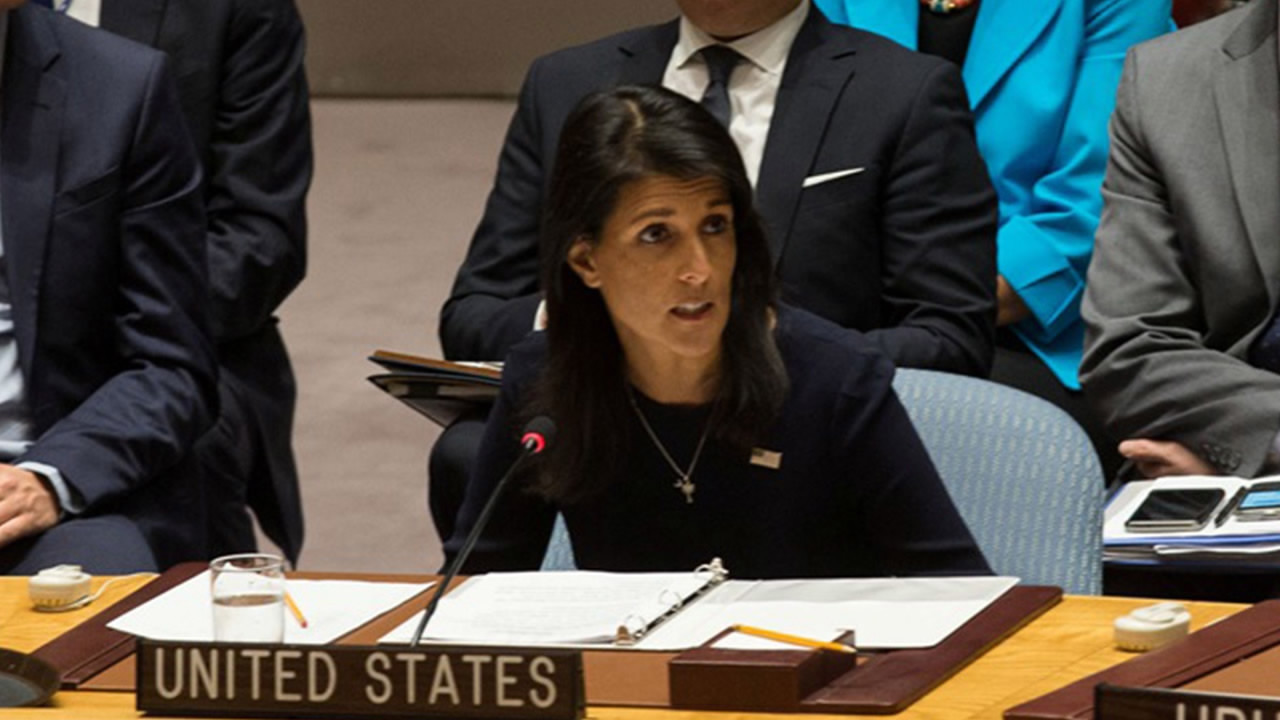
Members of the United Nations Security Council (UNSC) remained divided on Monday over possible new sanctions against the Democratic People's Republic of Korea (DPRK) over its latest nuclear test.
In an emergency meeting Monday, the United States, France and Britain, as well as Japan, were in favor of new sanctions, while countries like Russia advised diplomacy.
US Ambassador to the UN, Nikki Haley, called for "strongest possible measures" by the council against the DPRK.
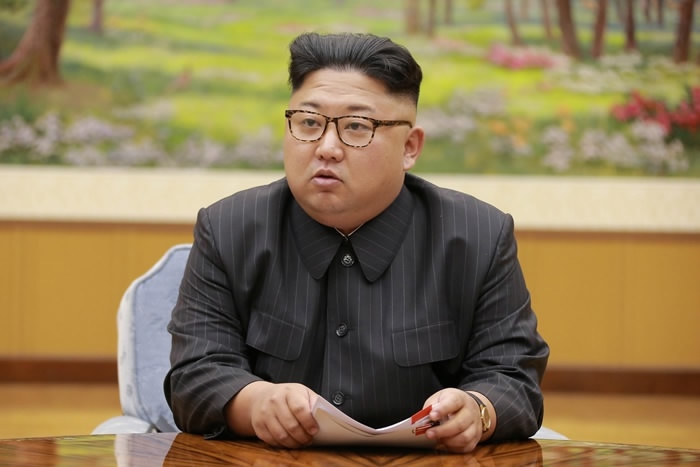
DPRK leader Kim Jong Un participates in a recent meeting with the Presidium of the Political Bureau of the Central Committee of the Workers' Party of Korea. /Reuters Photo
DPRK leader Kim Jong Un participates in a recent meeting with the Presidium of the Political Bureau of the Central Committee of the Workers' Party of Korea. /Reuters Photo
"The time has come to exhaust all diplomatic means to end this crisis, that means quickly enacting the strongest possible measures here in the UN Security Council," Haley told the council meeting that she had requested together with representatives of Britain, France, Japan and South Korea.
"Only the strongest sanctions will enable us to resolve the problem through diplomacy," said Haley. "We have taken an incremental approach, and despite the best intentions, it has not worked."
The DPRK wanted to be recognized as a nuclear power, but its leader Kim Jong Un showed that he was "begging for war," she stated.
At the end of the emergency meeting, Haley said her mission was circulating a draft resolution on the DPRK among council members.
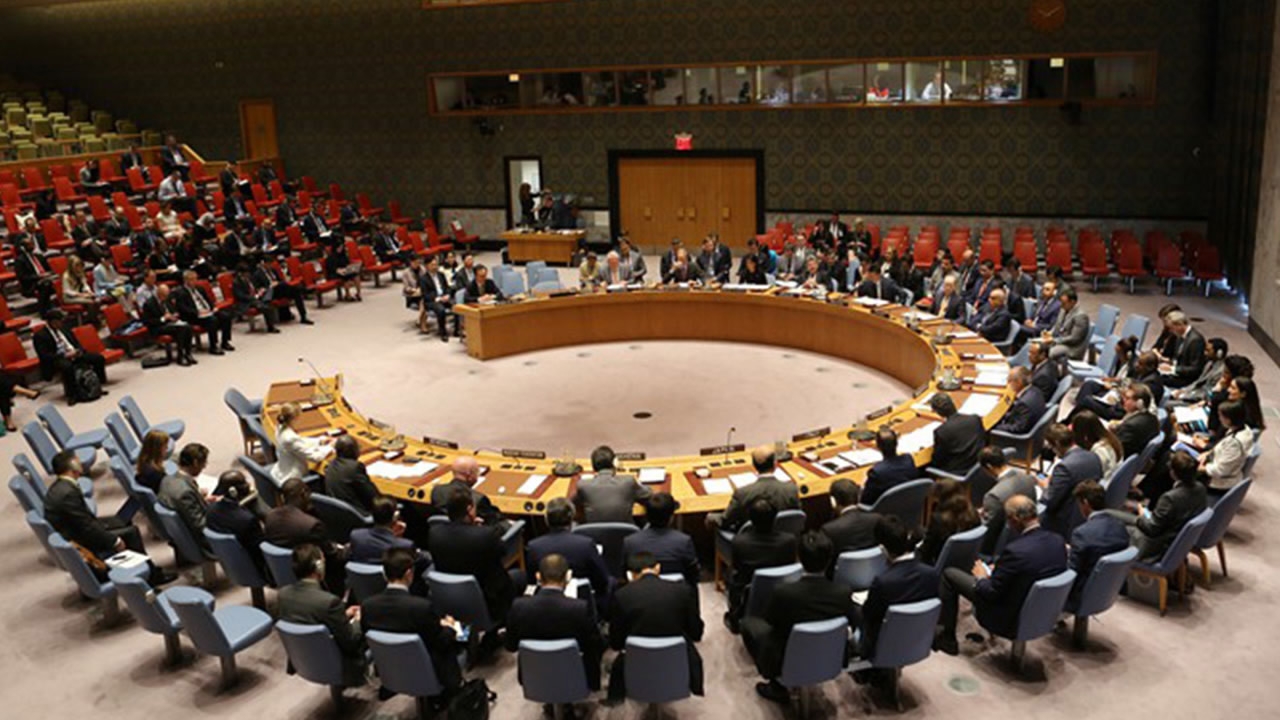
'China will never allow war on Korean Peninsula'
China's permanent representative to the UN, Liu Jieyi, condemned the DPRK for the latest nuclear test and urged the country to return to the track of dialogue.
The situation on the Korean Peninsula is falling into a vicious circle, he warned. "The issue must be resolved peacefully. China will never allow chaos and war on the peninsula," said the Chinese envoy.
China's proposal of a two-track approach, which promotes the de-nuclearization of the peninsula and the establishment of a peace mechanism in parallel; and the suspension-for-suspension initiative, which calls on the DPRK to suspend its nuclear and missile activities and the US and South Korea to suspend their joint military exercises; and the step-by-step concept from Russia, are the basis of a roadmap proposed by China and Russia, he said.
The joint proposal is practical and feasible as it is aimed at addressing the most urgent security concerns of the parties concerned, easing tension as early as possible, Liu said. "We hope the parties concerned will seriously consider it and actively respond to it."
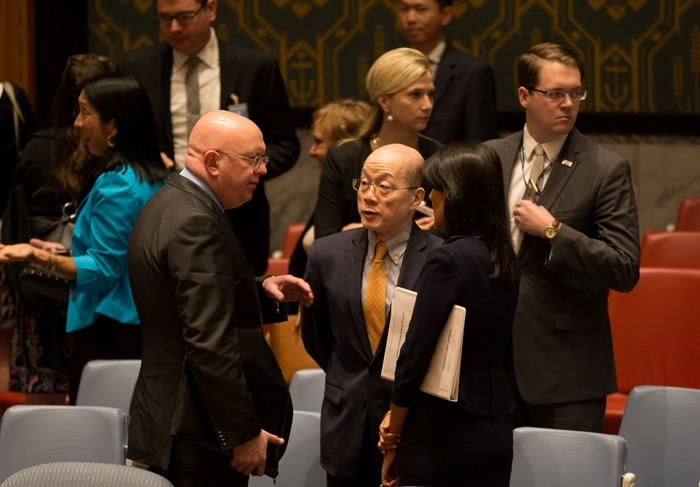
Chinese Ambassador to the UN Liu Jieyi (C) speaks with Russian Ambassador to the UN Vasilly Nebenzia (L) and US Ambassador to the UN Nikki Haley (R) after a meeting of the UN Security Council in New York, September 4, 2017. /Reuters Photo
Chinese Ambassador to the UN Liu Jieyi (C) speaks with Russian Ambassador to the UN Vasilly Nebenzia (L) and US Ambassador to the UN Nikki Haley (R) after a meeting of the UN Security Council in New York, September 4, 2017. /Reuters Photo
China called upon the international community to fully and comprehensively implement the relevant Security Council resolutions, firmly pushing forward the de-nuclearization of the Korean Peninsula and maintaining peace and stability in the region.
Russian envoy Vassily Nebenzia cautioned that past failure of the council to curb DPRK's nuclear and missile programs was owing to the fact that the resolutions "were only geared toward leveraging sanctions mechanisms."
"Russia calls on the international community not to yield to emotions, (but) to act in calm and balanced ways," he told the same meeting, adding that a comprehensive settlement can be achieved only through political and diplomatic channels.
DPRK's 6th nuclear test
On Sunday, the DPRK detonated a hydrogen bomb that can be carried by an intercontinental ballistic missile (ICBM), DPRK's Central Television announced. It was the country's sixth nuclear test since 2006.
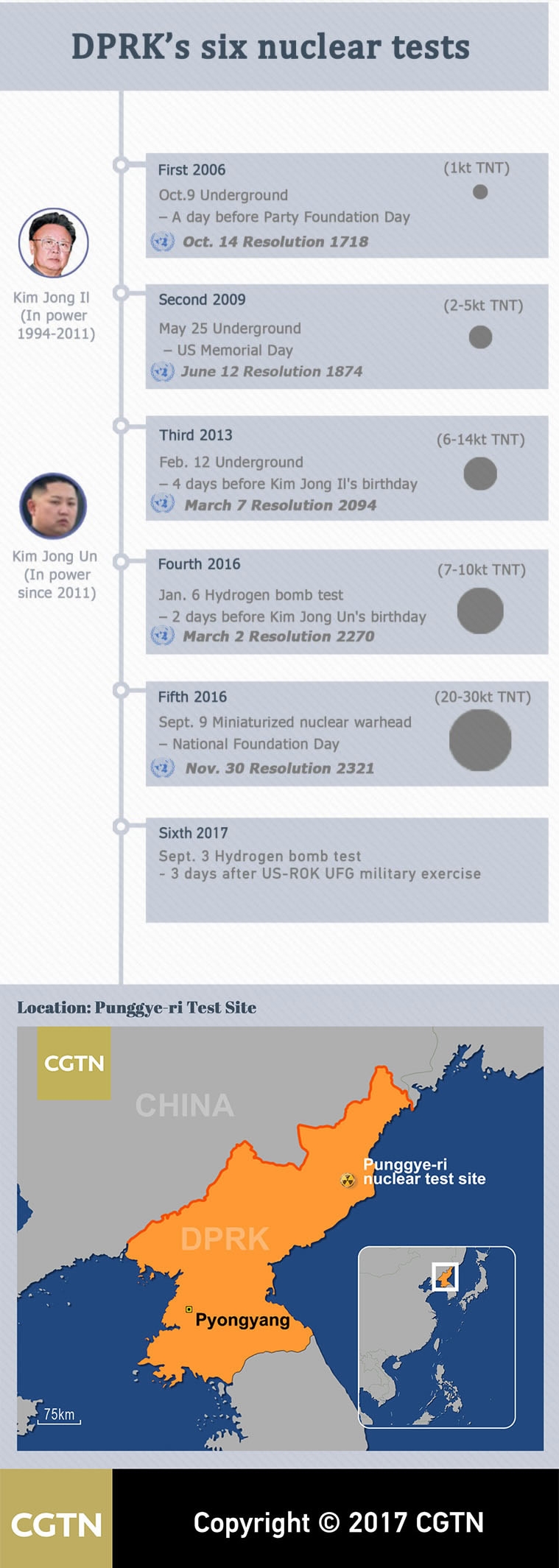
CGTN Graphic
CGTN Graphic
Following the hydrogen bomb test, the Chinese Ministry of Environmental Protection said on Monday that the levels of radiations in China's border regions with the DPRK were normal.
In the wake of the test, South Korea carried out a live-fire missile drill along its eastern coast on Monday. The South Korean army fired surface-to-surface ballistic missiles and its air force mobilized fighter jets to fire SLAM-ER precision-guided air-to-surface missiles.
Seoul also announced on Monday that the US Forces Korea (USFK) would soon install the four remaining Terminal High Altitude Area Defense (THAAD) missile defense launchers at its new southern base after the completion of an environmental assessment by the government.
China has repeatedly voiced its opposition of the deployment of the US THAAD system in South Korea.
11001km
Source(s): Xinhua News Agency

SITEMAP
Copyright © 2018 CGTN. Beijing ICP prepared NO.16065310-3
Copyright © 2018 CGTN. Beijing ICP prepared NO.16065310-3